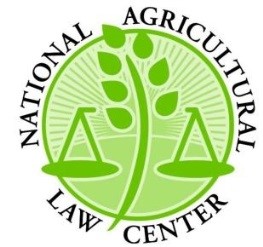A comprehensive summary of today’s judicial, legislative, and regulatory developments in agriculture and food. Email important additions to: camarigg at uark.edu
ANNOUNCEMENT: Join us TOMORROW, February 15, at 12 noon (ET) for an Agricultural & Food Law Consortium webinar: Legal Checkup on Checkoffs: Recent & Emerging Legal Issues in Federal & State Checkoff Programs. Sign-in details available here.
JUDICIAL: Includes labeling, FLSA, and crop insurance issues.
In NATIONAL RESTAURANT ASSOCIATION, Plaintiff–Appellant, v. The NEW YORK CITY DEPARTMENT OF HEALTH & MENTAL HYGIENE, et al., Defendants–Respondents, American Heart Association, American Medical Association, Center for Science in the Public Interest, Changelab Solutions, Coalition for Asian American Children and Families, Medical Society of the State of New York, National Association of Chronic Disease Directors, National Association of County and City Health Officials, National Associations of Local Boards of Health, New York Academy of Medicine, New York State Public Health Association, New York State American Academy of Pediatrics, Public Health Association of New York City, Public Health Law Center, and the Food Trust, Amici Curiae. 2017 WL 549039 (N.Y. Feb. 10, 2017), defendant, New York City Board of Health, required restaurants to provide factual information regarding sodium to consumers. Plaintiff challenged the order arguing that it “intrudes on the legislative function and thus violates the separation of powers; that it is arbitrary and capricious; that it is preempted by federal law; and that it violates the First Amendment rights of plaintiff’s members.” Court rejected plaintiff’s challenge, reasoning that the Board “acted legally, constitutionally and well within its authority in adopting this limited yet salutary rule.”
In Francisco Garcia Tamayo and Norberto Farciert, Plaintiffs, v. DHR Restaurant Co., LLC, d/b/a Rare Bar & Grill, Rare Chelsea Restaurant Group, and Douglas Boxer, Defendants, 14 Civ. 9633 (GBD), 2017 WL 532460 (S.D.N.Y. Feb. 3, 2017), plaintiffs, head chefs at two of defendants’ restaurants, claimed they worked at least seventy-two hours a week, but were not paid overtime wages or spread of hours by defendants. Defendants moved for summary judgment arguing plaintiffs are “exempt executive employees” under the Fair Labor Standards Act (FLSA) and not entitled to overtime wages or spread of hours compensation. Court observed that, “Section 7(a)(1) of the FLSA provides that an employee who works in excess of forty hours a week must receive compensation for “employment in excess of the hours above specified at a rate not less than one and one-half times the regular rate at which he is employed.” The court noted, however, that section “does not apply to ‘any employee employed in a bona fide executive … capacity.’” Parties disputed whether plaintiffs’ primary duties were managerial and whether they could hire and fire other employees. Summary judgment denied as court found “material questions of fact” remained as to whether management of the restaurant was plaintiffs’ primary duty.
Statements of Federal Financial Accounting Concepts and Standards, FASAB – Federal Accounting Standards Advisory Board, Original Pronouncements, Vol. 1, Statement of Federal Financial Accounting Standards 51, INSURANCE PROGRAMS, FASAB STATEMENT 51 (F.A.S.A.B.), 2017 WL 514494 (Jan. 18, 2017) concerned accounting and financial reporting standards for insurance programs. The statement “provides standards to ensure that insurance programs are adequately defined and report consistent information about the liabilities for losses incurred and claimed as well as expected losses during remaining coverage.” With respect to “adverse events,” each insurance program is responsible for settling losses from “specific adverse events.” Per the Federal Crop Insurance Corp, an adverse event “may be a single event or a series of events. Therefore, an adverse event has not occurred until all of the events in a series occur.”
LEGISLATIVE:
MEETING: House Committee on Appropriations: Subcommittee on Agriculture, Rural Development, Food and Drug Administration, and Related Agencies. Date: Feb 15, 10 a.m. Location: RHOB 2362A.
MEETING: Senate Committee on Environment and Public Works Meeting. An oversight hearing to examine modernization of the Endangered Species Act. Date: Feb 15, 10 a.m. Location: SD-406.
MEETING: House Committee on Agriculture, “Pros and Cons of Restricting SNAP Purchases.” Date: Feb 16, 10 a.m. Location: LHOB 1300.
REGULATORY: Includes AMS, EPA, FSIS, ITA, and NOAA rules and notices.
AGRICULTURAL MARKETING SERVICE:
Rule that a referendum be conducted among eligible Washington sweet cherry growers to determine whether they favor continuance of the marketing order regulating the handling of sweet cherries. Details here.
Rule proposes the issuance of a Federal Milk Marketing Order regulating the handling of milk in California. Info here.
ENVIRONMENTAL PROTECTION AGENCY: Rule establishes tolerances for residues of the ovicide/miticide hexythiazox in or on beet, sugar, root, and beet, sugar, dried pulp. Info here.
FOOD SAFETY AND INSPECTION SERVICE: Notice FSIS is hosting a public meeting to discuss the prevention of undeclared allergens in FSIS-regulated product. Details here.
INTERNATIONAL TRADE ADMINISTRATION: Notice sets forth the schedule and proposed topics of discussion for a public meeting of the Advisory Committee on Supply Chain Competitiveness. Details here.
NATIONAL OCEANIC AND ATMOSPHERIC ADMINISTRATION:
Rule NMFS implements an accountability measure for commercial harvest of king mackerel in the Florida west coast southern subzone of the eastern zone of the Gulf of Mexico exclusive economic zone. Info here.
Rule NMFS is prohibiting directed fishing for pollock in Statistical Area 610 in the Gulf of Alaska. Details here.
